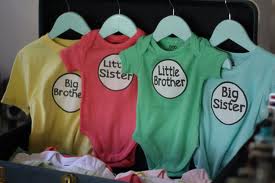There are many adjustments for a family when bringing a new baby into the household. The parents have to make room in their hearts and their home for the needs and demands of a new child. Everyone is sleep deprived. The pets are often puzzled, and certainly the siblings, although often excited, also have to learn a new way of being a family. Young children can show a wide range of pleasure and displeasure when a new baby joins them. Here are some things that researchers note:
- Whether a mother bottle or breastfeeds a new baby, there are generally increased confrontations between mother and firstborn, typically for those who bottle-feed. Mothers who breastfeed their second child are found to have a slightly higher level of positive involvement with their firstborn during feeding sessions.
- The younger the age of a child at the time of the birth of a sibling the more likely they are to demonstrate problem behaviors concerning toilet training, using security objects, and demanding a pacifier or bottle at night.
- Older children (age 3 and up) are more likely to have problems with baby talk or using clinging behavior. Although, some children take great pride in exhibiting more “mature” and care-taking behaviors with regard to a new sibling.
- Mother-child interactions may decrease in frequency after the birth of a sibling, while father-child interactions tend to increase.
- Older siblings tend to offer more toys, take toys, and hit than infants.
- Infants are more likely to watch and imitate older siblings.
- Infants tend to show increases in the frequency of social behavior directed to their siblings over time, while older children do not. The little ones love to “copy” the older sibs!
- Preschool girls socially interact more with their siblings than preschool boys.
- Preschool males touch their siblings more than preschool girls.
- The more social behavior an infant directs toward their older sibling, the more sociably the older sibling is likely to behave toward them later.
- There is a greater amount of prosocial behavior found between female siblings (in comparison to male siblings) and may be due to their greater frequency of interaction, which gives them more opportunity to develop prosocial skills.
- Male siblings pairs tend to interact less than female sibling pairs or male/female sibling pairs.
- Older sisters frequently play the manager role among siblings regardless of the sex of the younger child/children. (I was often accused of being the “bossy” big sister!)
- Girls with older brothers show less sex stereotyping of objects associated with females.
- Boys with older sisters show less sex stereotyping of “feminine” objects as well.
- Firstborns tend to be overachievers, often doing better in school.
- Some research suggests that close age spacing may hurt the younger sibling’s chances for high success in school.
- Adults often have higher expectations and more positive descriptions of oldest children, whereas only children are more likely to be described as spoiled and unlikeable.
It is helpful to families when parents learn more about child development age/stage expectations for their children. Many good websites and books are available. This knowledge can go a long way in helping parents anticipate problems and teach their children positive social and emotional skills. Everyone adjusts better to the arrival of a new baby when the parents take the lead in creating a harmonious family environment.

